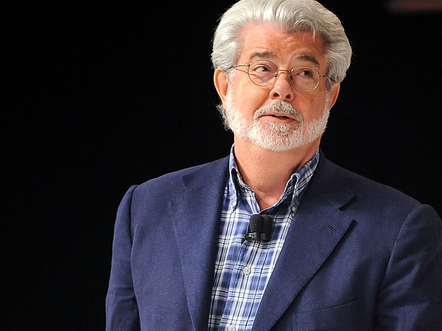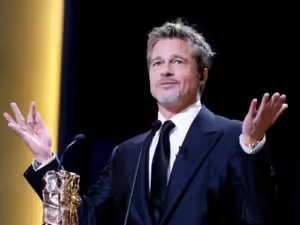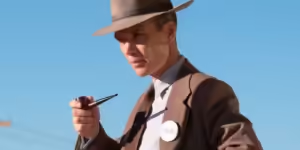
George Lucas, the legendary filmmaker and creator of Star Wars, has always been a trailblazer in the cinematic world. Recently, while speaking at the 77th Cannes Film Festival, Lucas was honored with the prestigious Palme d’Or for his incredible contributions to cinema. During this event, Lucas took time to reminisce about his storied career, from his early days with THX-1138 to the monumental success of Star Wars, and offered candid reflections on how the franchise has evolved since his departure following Disney’s acquisition of Lucasfilm in 2012.
Early Days in Filmmaking: A Fight for Creative Control
Lucas began his talk by reflecting on his early career, recalling the struggles of getting his first feature film THX-1138 to the big screen. He shared how Warner Bros. didn’t want to fund his trip to Cannes for the movie’s premiere, and how he and his co-writer Walter Murch had to sneak into their own screening. It was an uphill battle, but Lucas’ love for filmmaking, rather than the pursuit of money, kept him pushing forward. His passion for telling unique stories culminated in American Graffiti (1973), a low-budget film that turned out to be a huge financial success, raking in $115 million against a mere $750,000 budget. This success laid the foundation for Lucas’ next project—Star Wars.
The Birth of Star Wars: A Story for Kids
Lucas revealed that Star Wars was originally intended as a children’s movie, one that addressed the big questions kids face during adolescence. He explained that his vision was always to create a space fantasy that resonated with 12-year-olds who were navigating the complexities of growing up. He compared the backlash against characters like Jar Jar Binks and the Ewoks in the later films to the earlier criticism of C-3PO, emphasizing that these elements were meant to cater to a younger audience.
“People forget that it was supposed to be for kids going through puberty, who don’t know what they’re doing, and are asking all the big questions: What should I be worried about? What’s important in life?” Lucas remarked, adding that Star Wars contains all those deep themes, but they are often lost on older audiences who focus on the action rather than the underlying messages.
The Star Wars Prequels and Fan Backlash
Lucas also defended the much-maligned Star Wars prequels, which were met with mixed reception when they were first released. He acknowledged that older fans who had grown up with the original trilogy weren’t ready to watch a film geared toward younger viewers. He attributed some of the criticism to this generational shift, with fans struggling to reconcile their nostalgic love for the original films with the new directions the prequels took.
He addressed the infamous Jar Jar Binks character, who was widely panned at the time and remains a controversial figure among Star Wars fans. Lucas compared the outcry over Jar Jar to the negative response C-3PO received in the first movie, arguing that critics often miss the point that these characters were intended to bring humor and lightheartedness to the otherwise serious themes.
Defending His Vision: “It’s Always Been a Kids’ Movie”
Lucas reaffirmed that Star Wars was always meant to be a children’s movie, a fact he believes many people forget as they get older. “When I did the third one, it was the Ewoks: ‘Those are little teddy bears. This is a kid’s movie, we don’t want to see a kid’s movie.’ I said: ‘It is a kids’ movie. It’s always been a kids’ movie.’”
His comments reiterate his belief that the essence of Star Wars was to speak to young audiences, helping them navigate their emotional and psychological journeys while still delivering an epic space adventure. However, he also acknowledged that this intention sometimes clashed with the expectations of older audiences who had different ideas of what Star Wars should be.
The Disney Era: Ideas “Sort of Got Lost”
When Lucas sold Lucasfilm to Disney in 2012 for $4.05 billion, he stepped away from the franchise that he had built. He acknowledged that while he had a vision for where the franchise could go, Disney’s handling of the post-original trilogy era diverged significantly from his ideas. Lucas expressed disappointment that some of his key concepts, particularly around the deeper mythology of the Force, didn’t translate into the new films.
“I was the one who really knew what Star Wars was … who actually knew this world, because there’s a lot to it. The Force, for example, nobody understood the Force,” Lucas said. He mentioned that once the franchise was out of his hands, the corporate approach altered the fundamental aspects of the story he had built.
Despite the massive success of Disney’s Star Wars sequels, Lucas hinted that the studio had lost sight of the original spirit of the films. “A lot of the ideas that were in [the original] sort of got lost,” he noted, reflecting on the way the new films handled certain storylines and characters. Still, Lucas remains philosophical about his decision to sell, noting that when you give something up, you must let it go completely.
A Filmmaker’s Right to Alter His Work
Lucas also addressed the controversy surrounding his decision to go back and “clean up” the original trilogy with digital technology. He felt that as the creator, he had the right to present the films as he originally envisioned them, using the tools that became available with advancements in filmmaking technology. “I’m a firm believer that the director, or the writer, or the filmmaker should have a right to have his movie be the way he wants it,” Lucas said, defending his modifications.
Legacy and Impact
As Lucas reflected on his long and storied career, it was clear that despite any criticism, his legacy is secure. Few filmmakers have had as profound an impact on the industry as he has. Star Wars revolutionized Hollywood, pioneering new technology and transforming the way films are marketed, particularly through merchandising and licensing. Lucas’ decision to retain licensing and merchandising rights was a game-changer, allowing him to create a global empire that has endured for decades.
At the age of 80, George Lucas may have handed the reins of his creation to others, but his influence continues to resonate. Fans may debate the merits of the prequels, sequels, and the many creative decisions he made over the years, but Lucas remains steadfast in his belief that Star Wars will always be about the big questions—ones that resonate most with the 12-year-olds he created it for.
In the end, Lucas’ ability to shape an entire universe from his imagination, fight for his creative vision, and change the landscape of filmmaking has cemented his status as one of the most influential filmmakers in history. And as the original visionary behind the galaxy far, far away, George Lucas’ legacy will continue to inspire generations of filmmakers and fans alike.
George Lucas on the Evolution of Star Wars, Lost Ideas, and Fan Criticism

George Lucas, the creator of Star Wars, has always been a visionary filmmaker, shaping a galaxy that has captivated audiences for generations. However, his relationship with the franchise, particularly after selling Lucasfilm to Disney in 2012, has been a point of reflection and debate. Lucas has spoken candidly about his disappointment with some of the directions taken in the Star Wars sequels and his ongoing defense of the controversial changes he made to the original trilogy. Here, we explore Lucas’s thoughts on what he believes was lost after Disney took over, his perspective on the prequels, and how his early career influenced his filmmaking approach.
Lost Ideas in the Disney-Era Star Wars
One of Lucas’s most significant frustrations with Disney’s handling of Star Wars was the perceived loss of many key concepts from his original vision. When Disney purchased Lucasfilm for $4.05 billion, Lucas handed over his detailed story outlines for future films. However, Disney decided to move in a different direction. Lucas has stated that important ideas, particularly surrounding the Force, were not properly conveyed in the new films. He felt that he was the only one who truly understood the complexity and spiritual essence of the Force, which he believed was integral to the narrative.
“I was the one who really knew what Star Wars was,” Lucas said. “The Force, for example, nobody understood the Force.” This loss of depth and thematic continuity is something Lucas has lamented, especially as the franchise moved further away from the philosophical undertones that he had embedded in the original films.
The Evolution of Lucas’s Relationship with Disney
Initially, Lucas hoped to remain involved with the development of the post-sale Star Wars films. He had ideas for continuing the story of the Skywalker family and even offered Disney guidance. However, as time passed, it became clear that Disney wanted to chart its own course. Lucas described the decision to sell as bittersweet, recognizing that by selling Lucasfilm, he would no longer have control over the direction of his beloved franchise. “When you give it up, you give it up,” he said, acknowledging that it was difficult to let go.
Lucas’s relationship with Disney grew more distant as they moved forward with their own vision for the Star Wars sequels, which began with The Force Awakens (2015). While he initially stayed silent on his feelings about the sequels, it became apparent that he was not entirely pleased with the final products, particularly because they strayed from the more introspective, character-driven storytelling he had envisioned.
Lucas’s Thoughts on the Prequels: A Defense Against Critics
While the Star Wars prequels (The Phantom Menace, Attack of the Clones, and Revenge of the Sith) were met with divisive reactions from fans and critics, Lucas has consistently defended them. He emphasized that the prequels were made for a younger audience, just like the original trilogy, but were misunderstood by older fans who had grown up with the earlier films. The prequels were intended to explore the fall of Anakin Skywalker and the rise of the Empire, delving into political and emotional complexities that may have been lost on some viewers.
Lucas has also addressed the backlash against characters like Jar Jar Binks, a figure who became one of the first to be widely “canceled” by fans on the internet. He likened the negative reception to earlier criticisms of C-3PO and the Ewoks, arguing that these characters were meant to add humor and accessibility for younger audiences. “Star Wars has always been a kids’ movie,” he reiterated, standing by his decision to include these more lighthearted elements.
Early Career Influences on Lucas’s Approach to Star Wars
Lucas’s early experiences as a filmmaker significantly shaped his approach to Star Wars. His breakout film, American Graffiti (1973), which was made for just $750,000, became a massive box office hit and gave him the financial freedom to pursue more ambitious projects. It was this film’s success that led 20th Century Fox to take a gamble on Lucas’s next idea—a space opera that no one at the time believed would succeed. Star Wars (1977) was born out of this independent spirit, and Lucas has often spoken about his early battles to maintain creative control over his films.
His experience working with Francis Ford Coppola and setting up American Zoetrope, an independent film studio, also taught him the value of fighting for artistic freedom, a principle he carried with him throughout his career. It was this same drive that led Lucas to retain the merchandising rights to Star Wars, a move that turned out to be groundbreaking and incredibly lucrative.
The Reception of the Digital Enhancements and Fan Criticism
One of the most contentious aspects of Lucas’s legacy is his decision to make digital enhancements to the original trilogy, which included altering scenes and adding CGI elements. Many fans were upset by these changes, particularly with iconic moments like Han Solo’s showdown with Greedo in A New Hope (“Han shot first” became a rallying cry for purists). Critics argued that the CGI additions detracted from the films’ original charm and authenticity.
Lucas, however, has consistently defended these changes, stating that they were necessary to bring his original vision to life. “I’m a firm believer that the director, or the writer, or the filmmaker should have a right to have his movie be the way he wants it,” Lucas has said. He justified the alterations by explaining that technology at the time of the original films’ release didn’t allow him to fully realize the visual and narrative elements he had in mind.
Justifying the Changes: A Director’s Vision
For Lucas, the changes made to the original trilogy were about artistic integrity. He has often pointed out that, as a filmmaker, he wanted to present Star Wars as he had always imagined it. “The original Star Wars was like a first draft,” Lucas explained, noting that he wanted to go back and “fix” the things that had bothered him in the original cuts.
He also dismissed fans’ nostalgia for the unaltered versions, pointing out that when the original trilogy was briefly released on laserdisc, fans criticized the quality, saying it “looked terrible.” Lucas felt vindicated in his decision to update the films with modern technology, even if it angered die-hard fans.
Why Fans Disliked the CGI Enhancements
Many fans felt that the CGI changes took away from the practical effects and the gritty, lived-in feel that defined the original Star Wars trilogy. The digital updates, such as the inclusion of new alien creatures, background enhancements, and altered character interactions, were seen as unnecessary by those who loved the films’ original aesthetic. The debate around whether Star Wars should have remained untouched has continued for years, with purists calling for the release of the unaltered original trilogy in high-definition formats.
Despite the backlash, Lucas has stood by his choices, reminding audiences that, as the creator, he has the right to evolve his work as he sees fit.
Conclusion: A Legacy in Flux
George Lucas’s relationship with Star Wars is complex and multifaceted. From the creative struggles of his early career to his defense of the prequels and his decision to update the original trilogy with CGI, Lucas has never shied away from controversy. His post-Disney reflections reveal a filmmaker who remains protective of the universe he created, even as he watches it evolve in ways he may not have anticipated. While fans may continue to debate the merits of his choices, Lucas’s impact on cinema—and on the hearts of Star Wars fans—is undeniable. His belief in the creative freedom of filmmakers and his steadfast defense of his artistic vision will remain a crucial part of his legacy, even in a galaxy far, far away.



















